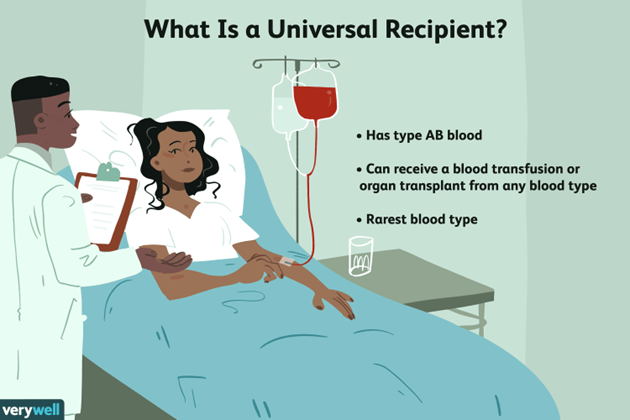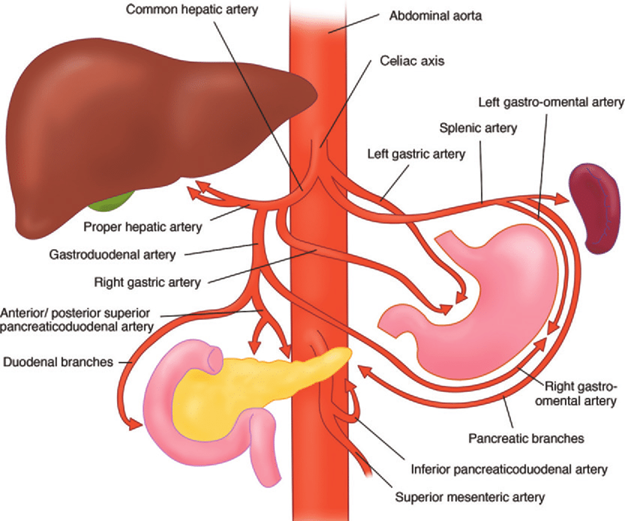Persons with type AB blood are sometimes called universal donors.
True
False
The Correct Answer is B
Persons with type AB blood are sometimes called universal recipients, not donors. This means they can safely receive a blood transfusion using any other blood type. Choice A is wrong because it confuses type AB blood with type O negative blood.
Type O negative blood is considered the universal donor type because it has no antigens on the surface of red blood cells and can be given to people of any blood type.
Type AB-positive blood is also considered the universal plasma donor type because it has both A and B antigens and can be given to patients with any blood type.
Plasma is the liquid part of blood that carries cells and proteins throughout the body.
The presence or absence of antigens and the Rh factor determine how a person’s immune system reacts to a blood transfusion or organ transplant.
Antigens are substances that can trigger an immune response if they are foreign to the body.
The Rh factor is a protein that can be either present (+) or absent (-) on the surface of red blood cells.

Nursing Test Bank
Naxlex Comprehensive Predictor Exams
Related Questions
Correct Answer is B
Explanation
The hypothalamus is the part of the brain that produces hormones that control the pituitary gland.
The pituitary gland then releases hormones that target other endocrine glands, such as the thyroid, adrenal, and gonads.
Therefore, the hypothalamus is the source of releasing hormones for target cells in the anterior pituitary gland.
Choice A is wrong because the anterior pituitary gland does not produce releasing hormones, but responds to them by secreting other hormones.
Choice C is wrong because the thyroid gland does not produce releasing hormones, but responds to them by secreting thyroid hormones.
Choice D is wrong because the posterior pituitary gland does not produce releasing hormones, but stores and releases hormones made by the hypothalamus, such as oxytocin and antidiuretic hormone.
Correct Answer is A
Explanation
The celiac artery supplies blood to the liver, spleen, and stomach.

It is one of the three major branches of the abdominal aorta, along with the superior mesenteric artery and the inferior mesenteric artery.
The celiac artery divides into three branches: the left gastric artery, the splenic artery, and the common hepatic artery.
Choice B is wrong because the brachiocephalic artery is a large vessel that arises from the aortic arch and supplies blood to the right side of the head and neck and the right arm.
It has no connection to the liver or spleen.
Choice C is wrong because the renal arteries are paired vessels that arise from the abdominal aorta and supply blood to the kidneys.
They are located below the superior mesenteric artery and above the inferior mesenteric artery.
Choice D is wrong because the tibial arteries are branches of the popliteal artery that supply blood to the lower leg and foot.
They are located in the posterior and anterior compartments of the leg.
The normal range of blood pressure in the celiac artery is about 100-120 mmHg systolic and 60-80 mmHg diastolic.
The normal range of blood flow in the celiac artery is about 200-300 ml/min. The normal diameter of the celiac artery is about 5-7 mm.
Whether you are a student looking to ace your exams or a practicing nurse seeking to enhance your expertise , our nursing education contents will empower you with the confidence and competence to make a difference in the lives of patients and become a respected leader in the healthcare field.
Visit Naxlex, invest in your future and unlock endless possibilities with our unparalleled nursing education contents today
Report Wrong Answer on the Current Question
Do you disagree with the answer? If yes, what is your expected answer? Explain.
Kindly be descriptive with the issue you are facing.
